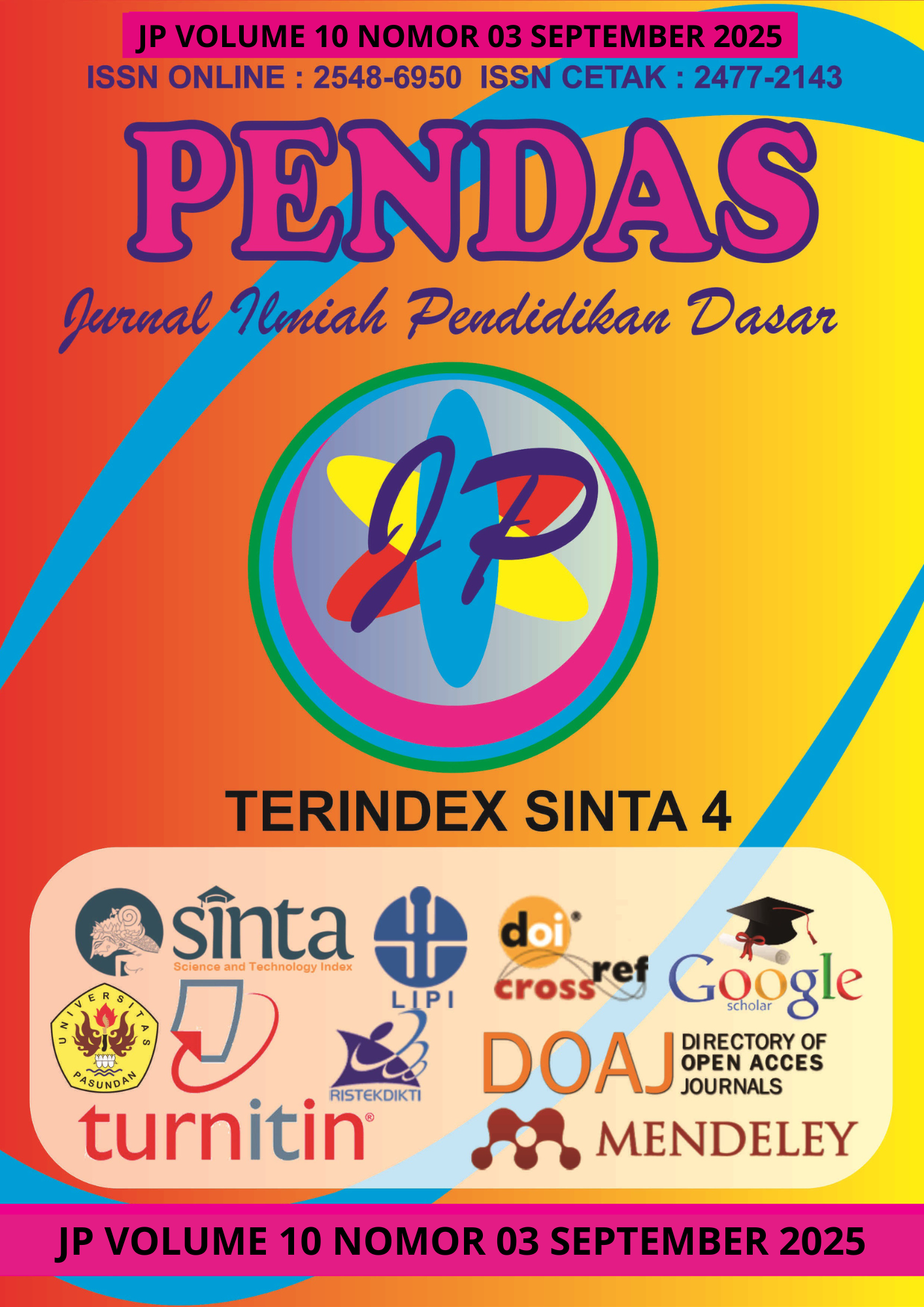PENGARUH KEPEMIMPINAN KEPALA SEKOLAH TERHADAP AKUNTABILITAS KEPROFESIONALAN GURU BIMBINGAN DAN KONSELING DI SMAS MUHAMMADIYAH LEMPANGANG
DOI:
https://doi.org/10.23969/jp.v10i03.28961Keywords:
leadership of school principals, guidance and counseling teachers, professional accountabilityAbstract
The leadership of the school principal has an important role in improving the quality of education in schools. One aspect that is influenced by the leadership of the school principal is the professional accountability of guidance and counseling teachers. Professional accountability of guidance and counseling teachers is very important to ensure that these teachers can carry out their duties effectively and professionally. The aim of the research is to determine the relationship between the principal's form of leadership and the professional accountability of guidance and counseling teachers in creating appropriate performance at the SMAS Muhammadiyah Lempangang school. To achieve this goal, this research uses quantitative research, namely describing the situation in the school environment based on data and figures obtained in the field, while data collection techniques use observation, documentation, interviews and questionnaires. The positive correlation research results show the Sig value. (2-tailed) between Principal Leadership (X) and Guidance and Guidance Teacher Professional Accountability (Y) is 0.000 < 0.005, which means there is a significant correlation between the principal's leadership variable and Guidance and Guidance Teacher professional accountability.
Downloads
References
Aksara.Aqib, Z. (2010). Profesionalisme Guru dalam Pembelajaran. Surabaya: Insan Cendekia. Bafadal, I. (2009). Peningkatan Kemampuan Profesional Guru Sekolah Dasar. Jakarta: Bumi
Badrujaman, Aip. 2011. Teori dan Aplikasi Evaluasi program Bimbingan Konseling.
Bass, B. M., & Avolio, B. J. (Eds.). (1994). Improving organizational effectiveness through transformational leadership. Sage Publications. https://doi.org/10.4135/9781452231218Amazon+4SAGE Journals+4SCIRP+4
Christine, M. (2009). Pedagogi: Strategi dan Teknik Mengajar dengan Berkesan. Bandung: PT Sari Purna Inves.D. Alfabeta.
Echols, J.M. & Shadili, H. (1996). Kamus Inggris Indonesia, Jakarta:PT. Gramedia.
Ghozali, I. (2011). Aplikasi Analisis Multivariate dengan Program IBM SPSS 19. Badan Penerbit Universitas Diponegoro.
Gibson, J. L., Ivancevich, J. M., & Donnelly, J. H. (2000). Organizations: Behavior, structure, processes (10th ed.). McGraw-Hill. https://doi.org/10.2139/ssrn.3022275
Jakarta: Indeks. Jakarta: PT. Rineka.
Leithwood, K., & Jantzi, D. (2006). Transformational school leadership for large-scale reform: Effects on students, teachers, and their classroom practices. School Effectiveness and School Improvement, 17(2), 201–227. https://doi.org/10.1080/09243450600565829SCIRP+5Academic Tree+5Taylor & Francis Online+5
Mulyasa, E. (2002). Kurikulum Berbasis Kompetensi (Konsep, Karakteristik, dan Impelentasi): Bandung: Remaja Rosdakarya. Peraturan Bersama Menteri Pendidikan Nasional dan Kepala Badan Kepegawaian Negara, Tentang Petunjuk Pelaksanaan Jabatan Fungsional Guru dan Angka Kreditnya ,Nomor: 03/V/PB/2010 Nomor: 14 Tahun 2010.
Namora Lumongga Lubis, Memahami Dasar-Dasar Konseling Dalam Teori dan Praktek, Edisi Pertama, (Jakarta: Kencana: 2001), h. 32.
Prihadi, S.F. (2004). Assessment Centre (Identifikasi, Pengukuran, dan Pengembangan Kompetensi). Jakarta: Gramedia Pustaka Utama.
Rampai, B. (n.d.). Pengembangan Akuntabilitas Program Layanan Bimbingan dan Konseling di Indonesia.
Sengga, E. L. P., Ladu, D. B., & Ilmiyah, S. (2022). Profil Identitas Profesi Konselor Berdasarkan Persepsi Peserta Didik. PD ABKIN JATIM Open Journal System, 3(1), 105– 110.
Soraya, D., & Connie, A. (2023). Kontribusi kepemimpinan kepala sekolah dan iklim organisasi terhadap kinerja guru BK. Jurnal Konseling Pendidikan, 11(2), 97–106. https://doi.org/10.24036/jkp.v11i2.2023
Sugiharto, Sunawan dan Sigit Hariyadi.2018. Pengembangan Akuntabilitas Program Layanan Bimbingan dan Konseling.UNNES Press.
Sugiyono. (2009). Metode Penelitian Kuantitatif, Kualitatif dan R & D. Alfabeta.
Sugiyono. (2016). Metode Penelitian Pendidikan Pendekatan Kuantitatif, Kualitatif, dan R &
Sugiyono. (2018). Metode Penelitian Kuantitatif. Alfabeta.
Suliyanto. (2005). Analisis Data Dalam Aplikasi Pemasaran. Ghalia Indonesia.
Supriadi, D. (2005). Membangun Bangsa Melalui Pendidikan. Bandung: Remaja Rosdakarya. Sukardi, D.K. & Kusmawati, N. (2008).Proses Bimbingan dan Konseling di Sekolah.
Supriatna, M. (2011).Bimbingan dan Konseling Berbasis Kompetensi (Orientasi Dasar Pengembangan Profesi Konselor. Jakarta: Raja Grafindo Persada.
Taher, dkk.2021. Profesionalisme Guru Bimbingan dan Konseling.Jurnal Pendidikan dan Bimbingan dan Konseling.Homepage
Taradifa, V. O., Suriansyah, A., & Sulistyana, S. (2024). Kontribusi kepemimpinan transformasional kepala sekolah, kompetensi profesional, dan komitmen terhadap kinerja guru BK SMA/SMK di Kalimantan Tengah. EDUKASIA: Jurnal Pendidikan dan Pembelajaran, 5(1), 1197–1204. https://doi.org/10.62775/edukasia.v5i1.1004Jurnal EdukAsia+1Jurnal EdukAsia+1
Yusuf, A. M. (2013). Metode Penelitian Kualitatif, Kuantitatif dan Penelitian Gabungan (Pertama). Renika Cipta
disability in prenatal genetic counseling. Journal of Genetic Counseling, 1-3.
Fariq, A. (2011). Perkembangan dunia konseling memasuki era grobalisasi. Pedagogi, II Nov 2011(Universitas Negeri Padang), 255-262.
Downloads
Published
Issue
Section
License
Copyright (c) 2025 Pendas : Jurnal Ilmiah Pendidikan Dasar

This work is licensed under a Creative Commons Attribution 4.0 International License.














































